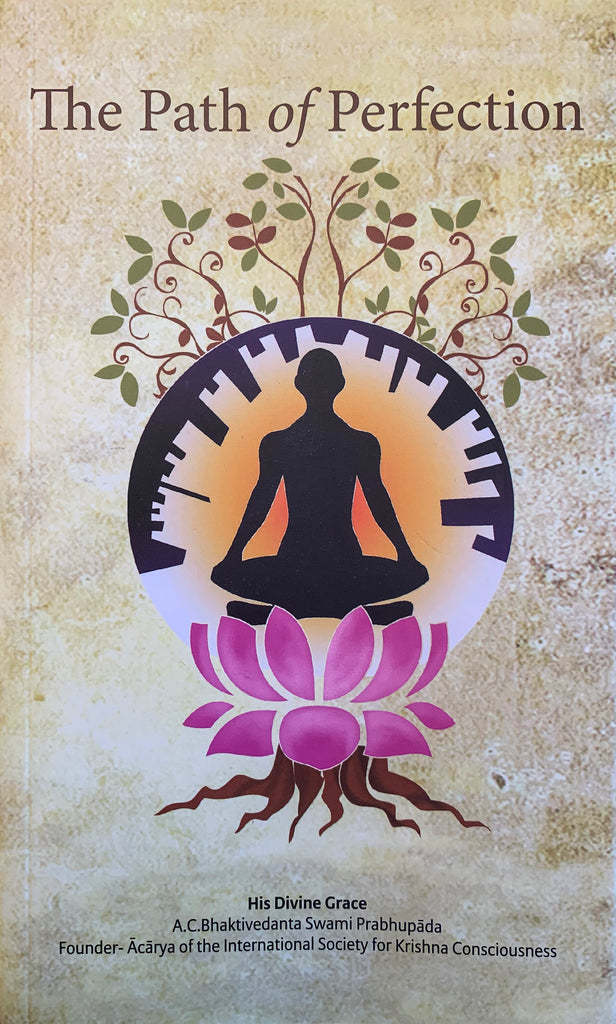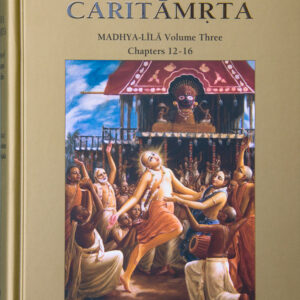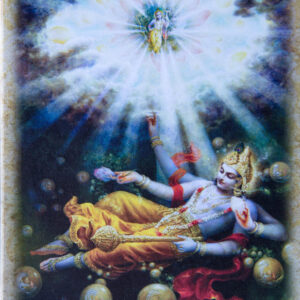Description
CHAPTER 1
Yoga As Action
In the sixth and eighth chapters of the Bhagavad-gītā, Lord Śrī Kṛṣṇa, the Supreme Personality of Godhead, explains that the eightfold yoga system is a means to control the mind and senses. This method, however, is very difficult for people to perform, especially in this age of Kali, an age characterized by ignorance and chaos.
Although this eightfold yoga system is particularly recommended in the sixth chapter of the Bhagavad-gītā, the Lord emphasizes that the process of karma-yoga, action in Kṛṣṇa consciousness, is superior. In this world, everyone acts to maintain his family, and everyone is working with a view to some self-interest, or personal sense gratification, be it concentrated or extended. But to act perfectly is to act in Kṛṣṇa consciousness, and this means acting detached from the fruits of labor.
It is our duty to act in Kṛṣṇa consciousness because we are constitutionally parts and parcels of the Supreme. The parts of the body work for the satisfaction of the entire body, not for the individual parts. The goal is the satisfaction of the complete whole. Similarly, the living entity should act for the satisfaction of the supreme whole, the Supreme Personality of Godhead, and not for his own personal satisfaction. One who can do this is the perfect sannyāsī and the perfect yogi. In the first verse of the sixth chapter of the Bhagavad-gītā, the chapter dealing with sāṅkhya-yoga, Bhagavān Śrī Kṛṣṇa states,
anāśritaḥ karma-phalaṁ
kāryaṁ karma karoti yaḥ
sa sannyāsī ca yogī ca
na niragnir na cākriyaḥ
“One who is unattached to the fruits of his work and who works as he is obligated is in the renounced order of life, and he is the true mystic, not he who lights no fire and performs no work.”
Sometimes sannyāsīs (renunciants) incorrectly think that they have become liberated from all material engagements and therefore no longer have to perform agni-hotra yajñas, or fire sacrifices. This is a mistake. Certain yajñas (sacrifices) have to be performed by everyone for purification. Since sannyāsīs are not traditionally required to perform yajñas, they sometimes think that they can attain liberation by ceasing to perform the ritualistic yajñas, but actually, unless one comes to the platform of Kṛṣṇa consciousness, there is no question of liberation. Those sannyāsīs who cease to perform yajñas are in fact acting out of self-interest, because their goal is to become one with the impersonal Brahman. That is the ultimate goal of the impersonalists (Māyāvādīs), who have one major goal or demand: to become one with the supreme impersonal Being. The devotees have no such demands. They are simply satisfied in serving Kṛṣṇa for the satisfaction of Kṛṣṇa. They do not want anything in return. That is the characteristic of pure devotion.
It was Lord Caitanya Mahāprabhu who expressed this devotional attitude so succinctly:
na dhanaṁ na janaṁ na sundarīṁ
kavitāṁ vā jagad-īśa kāmaye
mama janmani janmanīśvare
bhavatād bhaktir ahaitukī tvayi
“O Almighty Lord, I have no desire to accumulate wealth, nor to enjoy beautiful women. Nor do I want any number of followers. What I want is only the causeless mercy of Your devotional service in my life, birth after birth.” (Śikṣāṣṭaka 4) In essence, this is the bhakti-yoga system. There are many examples of the pure devotional attitude. Once Lord Nṛsiṁhadeva told Prahlāda Mahārāja, “My dear boy, you have suffered so much for Me. Whatever you want, ask for it.” Being a pure devotee, Prahlāda Mahārāja refused to ask for anything. He said, “My dear Master, I am not carrying out mercantile business with You. I will not accept any remuneration for my service.” This is the pure devotional attitude.
Yogis and jñānīs are demanding to become one with the Supreme because they have such bitter experience suffering the material pangs. They want to become one with the Lord because they are suffering in separation. A pure devotee, however, does not experience this. Although separate from the Lord, he fully enjoys the service of the Lord in separation. The desire to become one with the impersonal Brahman, or to merge with God, is certainly greater than any material desire, but this is not without self-interest. Similarly, the mystic yogi who practices the yoga system with half-open eyes, ceasing all material activities, desires some satisfaction for his personal self. Such yogis are desirous of material power, and that is their conception of the perfection of yoga. Actually, this is not the perfection of yoga, but a materialistic process.
If one practices the regulative principles of yoga, he can attain eight kinds of perfection. He can become lighter than a cotton swab. He can become heavier than a great stone. He can immediately get whatever he likes. Sometimes he can even create a planet. Although rare, such powerful yogis actually exist. Viśvāmitra Yogi wanted to beget a man from a palm tree. He was thinking, “Why should a man have to live so many months within the womb of his mother? Why can’t he be produced just like a fruit?” Thinking like this, Viśvāmitra Yogi produced men like coconuts. Sometimes yogis are so powerful, they can perform such acts, but these are all material powers. Ultimately such yogis are vanquished, because they cannot retain these material powers indefinitely. Bhakti-yogīs are not interested in such powers.








Reviews
There are no reviews yet.